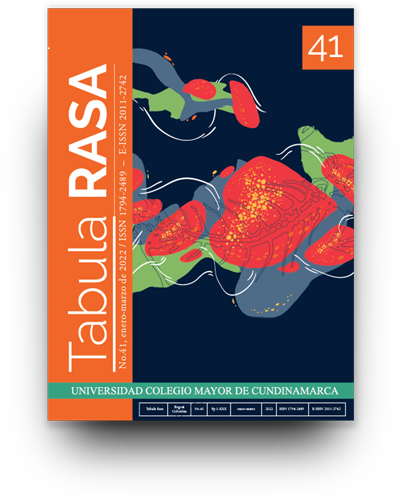The humanities of the anthropocen from Donna Haraway and Rosi Braidotti’s view.
Las humanidades del antropoceno desde la mirada de Donna Haraway y Rosi Braidotti.
Show authors biography
This article reflects upon the theoretical shift of humanities in the last few years. This is looked at in relation to what has been called the Anthropocene, along with the subsequent environmental turn in these disciplines, which cannot be explained without considering the decisive role played by technology in contemporary ways of life. Some of the main debates brought by feminist theoreticians Donna Haraway and Rosi Braidotti are examined, as they participate in the current critical setting which is devoted to analyse the political issues underlying the phenomena we witness and from which we participate. Those phenomena are viewed as articulations between the human and the non human, the biological, the technical, and social.
Article visits 209 | PDF visits 134
Downloads
- Braidotti, R. (2019a) Posthuman knowledge. Cambridge: Polity Press.
- Braidotti, R. (2013). Posthuman humanities. European Educational Research Journal, 12(1), 1-19.
- Braidotti, R. (2018). Por una política afirmativa. Itinerarios éticos. Barcelona: Gedisa. Braidotti, R. (2015). Lo posthumano. Barcelona: Gedisa.
- Crutzen, P. J. & Stoermer, E. F. (2000). The ‘Anthropocene’. Global Change Newsletter, 41, 17-18.
- Grosfoguel, R. (2016). Del «extractivismo económico» al «extractivismo epistémico» y «extractivismo ontológico». Una forma destructiva de conocer, ser y estar en el mundo. Tabula Rasa, 24, 123-143.
- Guattari, F. (1996). Las tres ecologías. Valencia: Pre-Textos.
- Guattari, F. (2015). ¿Qué es la ecosofía? Textos presentados y agenciados por Stéphane Nadaud. Buenos Aires: Cactus.
- Hall, S. & Mellino, M. (2011). La cultura y el poder. Conversaciones sobre los cultural studies. Buenos Aires: Amorrortu.
- Haraway, D. (2016). Staying with the Trouble: Making Kin in the Chthulucene. Durham: Duke University Press.
- Haraway, D. (2015). Chthulucene Manifesto from Santa Cruz. Revised from “Donna Haraway and Cary Wolfe in Conversation”, Manifestly Haraway. Minneapolis: University of Minnesota Press.
- Haraway, D. (2011). Speculative Fabulations for Technoculture’s Generations: Taking Care of Unexpected Country. Australian Humanities Review, 50. http://australianhumanitiesreview.org/2011/05/01/speculative-fabulations-for-technocultures-generations-taking-care-of-unexpected-country/
- Haraway, D. (2008). When species meet. Minneapolis: University of Minnesota.
- Haraway, D. (2004). Testigo_Modesto@Segundo_Milenio.HombreHembra©_Conoce_ Oncoratón®. Barcelona: Editorial UOC.
- Haraway, D. (2003). The Companion Species Manifesto. Dogs, People, and Significant Otherness. Chicago: Prickly Paradigm Press.
- Haraway, D. (2000). Diffraction as a Critical Consciousness. How Like a Leaf. An Interview with Thyrza Nichols Goodeve. New York: Routledge.
- Haraway, D. (1999). Las promesas de los monstruos: una política regeneradora para otros inapropiables. Política y Sociedad, 30.
- Haraway, D. (1991). A cyborg Manifesto. Simians, Cyborgs, and Women. The reinvention of nature. New York: Routledge.
- Jameson, F. (1998). The Cultural Turn: Selected Writings on the Postmodern, 1983-1998. Brooklyn: Verso.
- Keucheyan, R. (2013). Hemisferio izquierda. Un mapa de los nuevos pensamientos críticos. Madrid: Siglo XXI Editores.
- LaDanta LasCanta (2017). El Faloceno: redefinir el Antropoceno desde una mirada ecofeminista. Ecología Política, 53. https://www.ecologiapolitica.info/?p=9705
- Lash, S. (2005). Crítica de la información. Buenos Aires: Amorrortu.
- Latour, B. (2010). An Attempt at a “Compositionist Manifesto”. New Literary History, 41, 471-490.
- Latour, B. (2004). Politics of nature. How to bring the sciences into democracy. Cambridge: Harvard University Press.
- María Ptqk. (2017). A propósito del Chthuluceno y sus especies compañeras. http://www.mariaptqk.net/a-proposito-del-chthuluceno-y-sus-especies-companeras/
- Melucci, A. (1980). The new social movements: A theoretical approach. Social Science Information, 19(2), 199-226.
- Mentz, S. (2019). Break up the Anthropocene. Minneapolis: University of Minnesota Press. Moore, J. (2013).
- Anthropocene or capitalocene: On the origins of our crisis. (Part I: Excerpt from Ecology and the Accumulation of Capital). https://bit.ly/2TbQmg7
- Parikka, J. (2014). The Anthrobscene. Minneapolis: University of Minnesota.
- Rose, D.B. (2004). Reports from a Wild Country: Ethics for Decolonisation. Sydney: University of New South Wales Press.
- Sörlin, S. (2014). Environmental Turn in the Human Sciences. Will it become decisive enough? https://www.ias.edu/ideas/2014/sorlin-environment
- Stiegler, B. (2018). The Neganthropocene. London: Open Humanities Press.
- Tsing, A. (2015). Feral biologies. Anthropological Visions of Sustainable Futures, February 12-14, Centre for the Anthropology of Sustainability (CAOS), University College London.
- Yusoff, K. (2019). A Billion Black Anthropocenes or None. Minneapolis: The University of Minnesota Press.
- Zylinska, J. (2018). The end of Man. A feminist counterapocalypse. Minneapolis: University of Minnesota Press.
- Zylinska, J. (2014). Minimal Ethics for the Anthropocene. Ann Arbor: Michigan Publishing/ Open Humanities Press.








